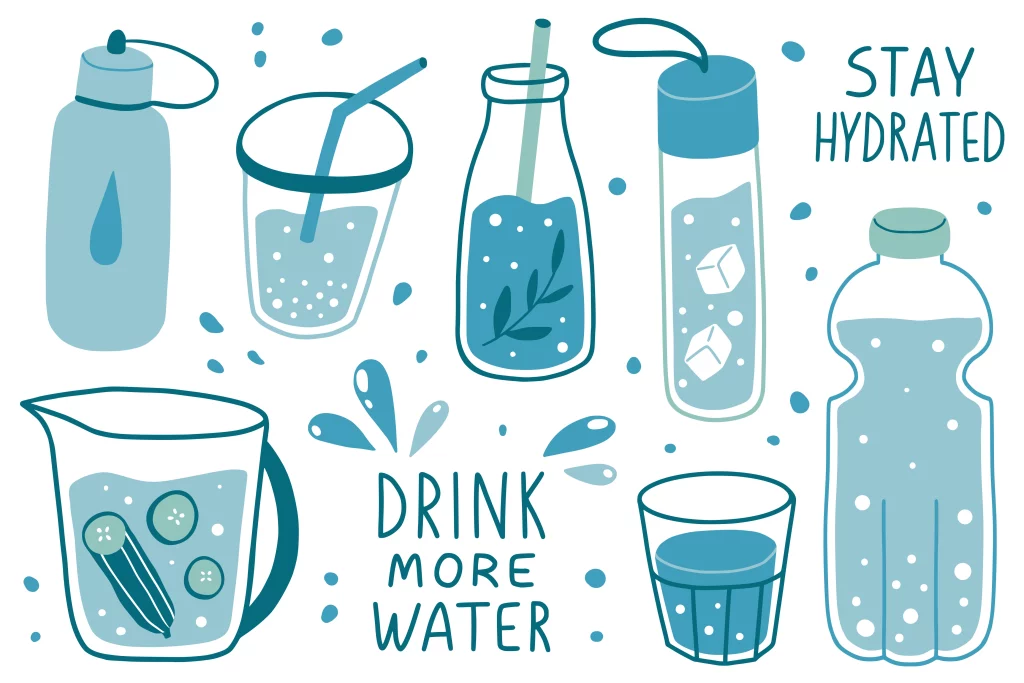Intermittent fasting can be a beneficial way to improve health and lose weight, but it can also be challenging to maintain. Proper hydration is crucial during fasting, as our body uses stored water when we fast. In this post, we’ll explore the importance of hydration during fasting and provide tips on how to stay hydrated. By drinking at least 8 cups of water per day, carrying a water bottle, and avoiding dehydrating liquids, you can stay hydrated during fasting and experience improved energy levels, reduced hunger, improved digestion, and mental clarity. With these tips, you can master your fast and achieve your health goals.
The Science of Hydration
Water is essential for life, and it plays a crucial role in many bodily functions, including regulating body temperature, transporting nutrients, and removing waste products. When we fast, our body begins to use stored energy, including water. This means that we need to be especially mindful of our hydration levels during a fast, to ensure that we’re not depleting our body of essential fluids.
One common misconception about hydration is that it’s all about drinking water. While water is important, it’s not the only way to stay hydrated. Other sources of hydration include fruits, vegetables, and other foods that are high in water content. These can include cucumbers, watermelon, and celery, among others.

Tips for Staying Hydrated During a Fast
- Drink Plenty of Water: This is perhaps the most obvious tip, but it bears repeating. Drinking water is essential for staying hydrated, especially during a fast. Aim to drink at least 8 cups of water per day, and consider carrying a water bottle with you at all times.
- Eat High-Water Content Foods: As mentioned earlier, foods that are high in water content can also help you stay hydrated. Consider adding water-rich fruits and vegetables to your diet, such as cucumbers, watermelon, and lettuce.
- Avoid Caffeine and Alcohol: Both caffeine and alcohol can be dehydrating, so it’s best to avoid them during a fast. If you must have a cup of coffee or a glass of wine, make sure to also drink plenty of water to counteract the dehydrating effects.
- Listen to Your Body: One of the most important tips for staying hydrated during a fast is to listen to your body. If you’re feeling thirsty, drink water. If you’re feeling lightheaded or dizzy, it may be a sign that you’re dehydrated and need to drink more fluids.
Benefits of Staying Hydrated During a Fast

Staying hydrated during a fast can offer many benefits, including:
- Improved Energy Levels: When you’re properly hydrated, your body can function more efficiently, which can lead to improved energy levels and productivity.
- Reduced Hunger and Cravings: Drinking water and eating high-water content foods can help you feel fuller for longer, which can reduce hunger and cravings.
- Improved Digestion: Staying hydrated can help promote healthy digestion, which is especially important during a fast when your body is already under stress.
- Improved Mental Clarity: Dehydration can cause brain fog and other cognitive issues. Staying hydrated can help improve mental clarity and focus.
Conclusion
Hydration is essential for overall health and wellbeing, and it’s especially important during a fast. By drinking plenty of water and eating high-water content foods, you can stay hydrated and optimize your performance during a fast. Don’t forget to listen to your body and take breaks as and when required. With a little bit of effort and mindfulness, you can master your fast and achieve your health and wellness goals.
Frequently Asked Questions (FAQs)
- Why is hydration important during fasting?
Hydration is important during fasting because our body uses stored energy, including water, when we fast. Therefore, staying hydrated during a fast ensures that we’re not depleting our body of essential fluids, which are required for many bodily functions. - How much water should I drink during a fast?
Aim to drink at least 8 cups of water per day, and consider carrying a water bottle with you at all times. However, the amount of water you need may vary depending on factors such as your body weight, activity level, and climate. - Can I drink other liquids besides water to stay hydrated during a fast?
Yes, you can also eat fruits, vegetables, and other foods that are high in water content to stay hydrated. However, it’s important to avoid dehydrating liquids such as caffeine and alcohol, as they can counteract your efforts to stay hydrated. - What are the benefits of staying hydrated during a fast?
Staying hydrated during a fast can lead to improved energy levels, reduced hunger and cravings, improved digestion, and improved mental clarity and focus. - How can I tell if I’m dehydrated during a fast?
If you’re feeling thirsty, it’s a sign that you may be dehydrated and need to drink more fluids. Other signs of dehydration include lightheadedness, dizziness, fatigue, and dry mouth. It’s important to listen to your body and drink water or eat water-rich foods if you’re feeling any of these symptoms.







